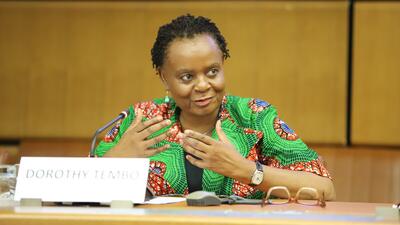
World Cotton Day Remarks, ITC Deputy Executive Director Dorothy Tembo
Deputy Executive Director Dorothy Tembo joins the World Cotton Day 2023 celebration, hosted by the Secretariats of the United Nations Industrial Development Organization (UNIDO) and the Food and Agriculture Organization of the United Nations (FAO) on Wednesday 4th of October in Vienna, Austria. The celebration is co-organized with the secretariats of the International Trade Centre (ITC), the World Trade Organization (WTO), the United Nations Conference on Trade and Development (UNCTAD) and the International Cotton Advisory Committee (ICAC)
Ladies and gentlemen, distinguished guests,
I am honoured to be here on World Cotton Day 2023 alongside such esteemed leaders and advocates, and I’m excited to discuss cotton’s transformative impact for jobs, sustainability, and inclusion.
We’ve made notable progress since the first World Cotton Day, an event made possible following the C-4’s efforts. We’ve been fortunate at ITC to work closely with the C-4, including through the Route du Coton, in boosting the competitiveness of the cotton, textile, and apparel sectors.
Today, I will walk you through four points.
First, I’ll share stories from West Africa about the sector’s potential. Second, I’ll outline challenges the sector faces, drawing from my country of Zambia, and explain how to move forward. I’ll then look at the African continent as a whole, showing the importance of the cotton-to-clothing value chain, and close with a reminder about why partnerships matter.
First, I’d like to talk to you about West Africa, where the cotton and textiles sectors play an integral role. Under our West Africa Competitiveness Program, WACOMP, we’ve provided 40 small businesses with training and coaching, bringing many of them to regional and international trade fairs. This led to them securing contracts, funding, and greater exposure to international markets. WACOMP has also served for developing a regional investment profile for the textile sector, aiming to draw in investors and help regional investment promotion agencies determine how they can best support producers.
At the country level, Burkina Faso is a key example within West Africa of the cotton and textile sectors’ potential, which is why ITC was glad to work with producers and partners to hold a fashion show at the first World Cotton Day four years ago.
These results give us hope for the future. But recent years have been hard for the cotton sector. In Zambia, COVID-19 and climate change led to cotton yields dropping by nearly one-third in 2021 compared to the year before. That’s why ITC has worked with the International Cotton Advisory Committee to help Zambian farmers double their yields.
Today, over 400 pilot farmers have achieved 1000 kilograms per hectare of seed cotton—double the national average. We’re now reaching 50,000 farmers across Zambia, either through direct training or having participants in our pilot programmes share their expertise with others.
The support of the Afreximbank has been invaluable in helping cotton producers across dozens of African nations recover from the pandemic’s impacts. And this is especially important given how crucial cotton is for the continent. Our “Made by Africa” report, published with the African Union and the EU, identified cotton clothing as one of four value chains that can boost intra-regional trade in Africa and create jobs for women and youth.
But delivering on cotton’s potential requires deeper integration, both within regions like West and Central Africa, and throughout the continent. It means a greater focus on sustainability—where cotton producers in Africa already have a competitive advantage—and on inclusion, especially for women and youth producers. And it means focusing on value addition.
In Egypt, Morocco, and Tunisia, for instance, we’ve partnered with small businesses under our Global Textiles and Clothing Programme to help them get better at dyeing and finishing cotton—leading to over $75 million in additional exports, nearly 3900 new jobs, and major cuts in greenhouse gas emissions, water and electricity consumption, and production costs.
We also need value chain actors to collaborate more across borders, leveraging their shared talents. We’ve seen the results in Madagascar and Mauritius, where industry players have explored foreign markets together, drawing from Mauritius’ strengths in textiles and Madagascar’s strengths in garments. We’re excited to see more collaborations under the AfCFTA and are working on ensuring small businesses can leverage the agreement’s potential through our One Trade Africa programme.
Lastly, for African cotton producers to succeed, they need greater linkages with international brands and local partners. That’s why we’ve teamed up with local social enterprises so these organizations can help artisans, including those in the cotton sector, connect with major global brands under our EU-supported Ethical Fashion Initiative.
Today, it’s clear that a cotton-to-clothing value chain in Africa is essential for livelihoods, inclusion, and sustainability. This is a message that we must share not just on World Cotton Day, but every day.
Thank you.




